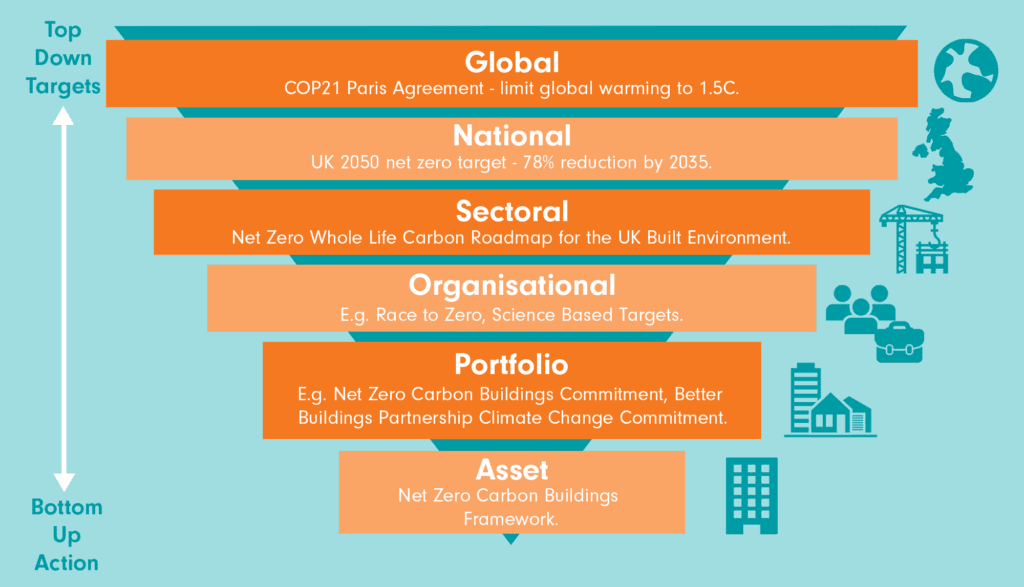Scaling climate change mitigation: Where do net zero buildings fit in?

The 2020s are a decisive decade for climate action. With now only 8 years left to achieve 2030 climate targets, radical and rapid transformation from businesses and the global economy is essential. And if we fail? The IPCC’s Sixth Assessment Report made the message clearer than ever: the consequences will be devastating.
Climate change is a global issue, requiring action from the global community. In 2015, the COP21 Paris Agreement set the ambition to limit global temperature rise to 1.5 degrees. The following Nationally Determined Contributions at COP21 and COP26 aim to achieve net zero by mid-century.
These ‘top-down’ climate commitments set by nations cascade down into legislation and sector priorities across the whole economy. We now know that the built environment sector is directly responsible for 25% of UK emissions and therefore needs to make real tangible carbon savings to achieve UK targets. As global, national and sectoral net zero ambitions have solidified, there has been a growth of interest around net zero initiatives from built environment stakeholders dealing with the issue on the ground.
This rapid influx of net zero initiatives has provided the built environment industry with a tremendous amount of choice when it comes to developing their net zero ambitions, but it is not always clear which initiatives are most relevant to you. This blog aims to bring clarity to a range of net zero initiatives and provide guidance on which commitment is right for you and for your stage in the journey to net zero.
Scaling Climate Action
The diagram above and table below present the different scales of net zero initiatives and their role to help in decarbonising the built environment.
How does this impact you?
The above hierarchy illustrates how net zero initiatives can be made at a range of decision-making levels. The key to meeting global and national climate targets however lies with leveraging our power to act on climate at smaller scales, with the intention of delivering real change at a larger scale. To achieve net zero across your organisation, you must first achieve net zero across your various portfolio; to achieve net zero across your portfolio, you must first understand how to achieve net zero across individual assets.
If your organisation is serious about climate action, producing decarbonisation plans with science-based targets is a crucial step in your journey. Moreover, joining third-party verified commitments, such as the Race to Zero, validates action; confirming that an organisation is measuring, managing and reporting carbon emissions, and ensuring holding themselves to account on their commitments. For individual assets and portfolios, UKGBC’s ANZ programme offers advice and frameworks to encourage net zero carbon and ensure the delivery of the Net Zero Whole Life Carbon Roadmap is achieved.
To find out more or get involved, please follow the links above or get in contact with us via: ANZ@ukgbc.org.
Related
Navigating the challenges around hard-to-recycle materials

What are the environmental impacts of construction materials? An introduction to Embodied Ecological Impacts

Why is social value so crucial when developing and managing commercial real estate?

Biodiversity Net Gain: Are you ready for the incoming legislation?

